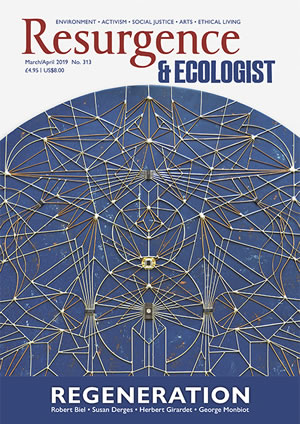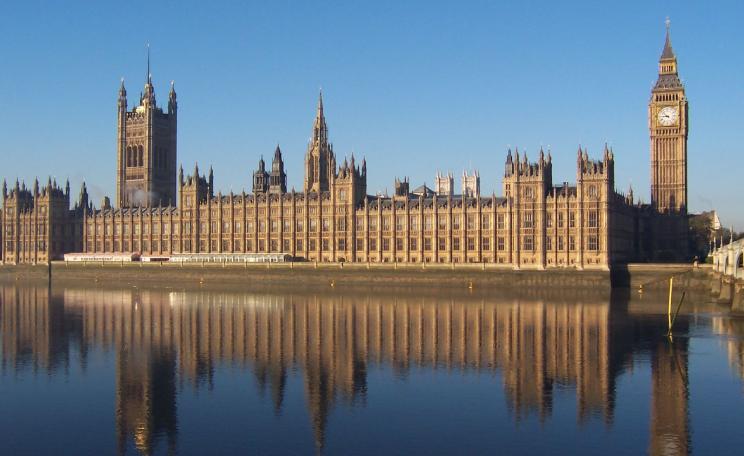-
From wildfires in the USA, coral die-back in the tropics and the deadly hurricanes battering small islands, the signs are crystal clear. Human impacts on the environment have reached a critical stage, potentially eroding the conditions of life on Earth.
The latest issue of Resurgence & Ecologist is out next week!
The human consequences of these changes are plain to see and reported daily: economic instability, large-scale involuntary migration, conflict, famine, and the collapse of economic and social systems. But mainstream political and media coverage does not link these stories to the climate and ecological emergency that is already upon us.
Can we really dismantle the toxic systems that have given rise to these gargantuan problems in the short window of 12 years (now 11) that the UN’s Intergovernmental Panel on Climate Change said we had to pull the emergency brake?
Extinction Rebellion

No-one knows what will happen and no-one can say for sure whether or not fundamental ecological tipping points have already been breached. The good news is there are millions of people mobilising to stop humanity falling off a cliff.
These campaigners have some sharp new ideas about how to create kinder, regenerative societies that can start the process of restoring nature and create communities characterised by resistance and resilience. They want to do more than just avoid extinction or merely survive. They are building a movement built on solidarity and well-being so everyone, and every part of everyone, can flourish.
Ending domination over nature goes hand in hand with tackling all forms of domination and hierarchy (men over women, old over young, one ethnicity or religion over another and binary forms of sexuality).
One of the fastest growing new movements that's growing this kinder, actively inclusive DNA is Extinction Rebellion (XR). Launched in October 2018 in the UK, it has engaged over a million people in 65 countries. As of March 2019 had 206 groups established in 24 countries.
Extinction Rebellion's main aim is to spark an international movement that will challenge governments around the world through the tools of mass civil disobedience.
International solidarity
The rebels have three key demands: that the UK government tell the truth about the climate devastation by declaring an emergency and repeal of inconsistent laws; the enactment of new policies in line with climate science to get to net zero emissions by 2025; and the establishment of a citizen’s assembly to create a democracy fit for purpose which is capable of protecting people and nature.
Extinction Rebellion have injected a new sense of energy and urgency into the climate movement, and thousands joined in non-violent actions by blocking London bridges and disrupting traffic at busy intersection.
Whilst the media headlines have focused on their UK work, Extinction Rebellion UK have started an International Solidarity Network to utilise its global reach and to support existing resistance in the majority world, working closely with activists in West Papua, Bangladesh, Mongolia and the Caribbean. Support has included provision of media training, funding for secure communications and joint actions in the UK requested by Majority World activists.
For example, Ghanaian Extinction Rebellion activists held an event calling for action on the Climate and Ecological Emergency in Afrika, in solidarity with those in the global south and the entire world.
Mawuse Yao Agorkor is an activist with SMERJAPIC-WA (Stop the Maangamizi). ‘Maangamizi’, from the Kiswahili Afrikan language, refers to the continuum of crimes of genocide and ecocide. Agorkor said: “The impact of the climate catastrophe is part of our daily life. This is why this event is important."
The activists in Ghana highlighted excessive plastic pollution in their seas, deforestation and the devastation caused by either flooding or drought plus wastewater with toxic chemicals polluting their drinking water as key areas of actions.
Emergency coalition
The Phulbari Solidarity Group is a group of Bangladeshis campaigning against coal mining in their country, which is one of the most climate vulnerable countries in the world.
Rumana Hashem, the founder of the Phulbari Solidarity Group, welcomes Extinction Rebellion’s work and said that on-going civil disobedience to decarbonise lifestyles and to protect our planet from criminal extractive companies and governments was long- overdue.
In December 2018, Extinction Rebellion supported a solidarity action led by Bangladeshi protesters and transnational campaigners against the development of coal mines in the Phulbari region of Bangladesh by blocking the entrance to the venue of the Annual General Meeting of the London-based company GCM Resources. Activists disrupted the AGM by occupying the front entrance for four hours, bringing their struggle to the attention of the major shareholders and GCM’s Board members.
Extinction Rebellion is also linking and learning from other movements and was active in Katowice, Poland in December 2018 during COP 24. Extinction Rebellion supported the Alliance of Small Islands States (AOSIS) and the Climate Vulnerable Forum (CVF) – together representing over 80 countries with one billion people – pull together an international “emergency coalition” to reject the weak language that would have condemned them to extinction.
The speech of Former President Mohammed Nasheed, Head of the Delegation of the Maldives, and Chair of AOSIS, struck a defiant tone by stating: “We are not prepared to die… We are not going to become the first victims of the climate crisis. Instead we are going to do everything in our power to keep our head above water.
"We harbour no illusions about the dangers. And we are acutely aware of our own vulnerability. Climate change is a national security issue for us. It is an existential threat…we plan to survive in a warming world, any way we can.”
Toxic systems
At this pivotal moment in history, it is important for all minority world movements to use their platforms and resources to show solidarity with those on the frontlines. Activists in the Majority World are paying a heavy price for defending nature with reports of 4-7 nature defenders being murdered each week.
It is vital to shine a light on the lived experience of climate and ecological breakdown, challenge neo-colonialism in all its forms and take action here in the minority world to confront the devastation caused by unaccountable extractive industries.
Support is also being provided, when requested, to the youth-led school strikes movement, started by Greta Thunberg, and to the newly emerging Birthstrike movement which is taking off in many countries to support people who are choosing to not bring children into this world unless and until conditions improve. In the US, the Sunrise Movement is building bi-partisan support for a 10-year mobilisation /investment plan called the Green New Deal.
What all these movements have in common is a complete rejection of the neo-liberal economics and business as usual politics. Yes, it is too late to prevent all the negative impacts of climate change. But nature can’t destroy our capacity to nurture. It cannot destroy our capacity to love and our sense of justice.
We can and must redesign human societies based on love, justice and planetary boundaries so no person or society is left to face devasting consequences and we learn to restore nature together. Faced with toxic systems that are destroying all life on Earth, affirmation of this vision and rebelling against whatever gets in its way becomes a sacred duty for all.
The rebellion has to be global to take on corrupt and powerful elites everywhere. That is why I joined the International Rebellion this week which has seen a series of actions to bring London to a halt. We can and must succeed in catalysing a peaceful revolution to end the era of fossil fuels, nature extraction and capitalism. Life on Earth literally depends on it. I hope you will join the rebels where ever you are.
This Author
Farhana Yamin is a climate change lawyer, an activist with Extinction Rebellion and associate fellow at Chatham House. An edited version of this article will appear soon in Resurgence & Ecologist magazine.
Image: Activists in Ghana. Gilogcal, Facebook.




